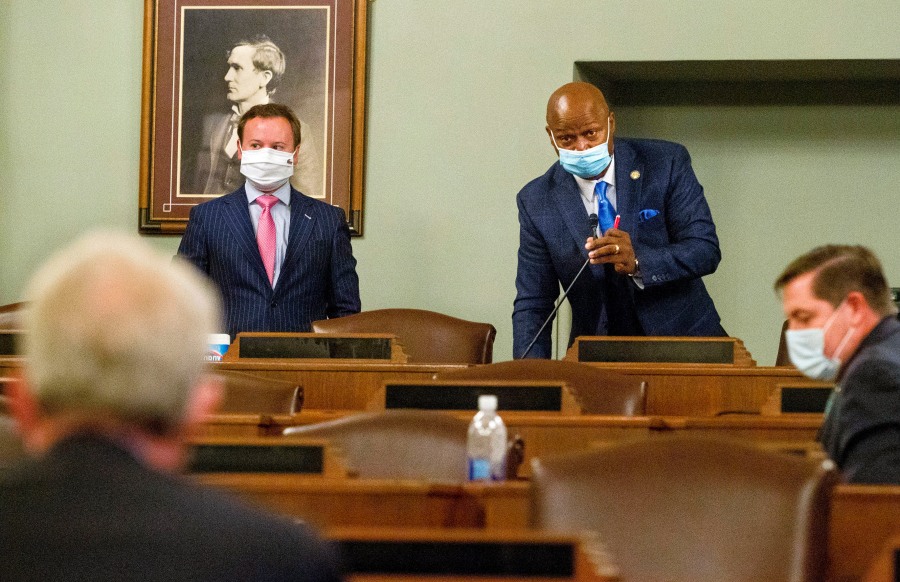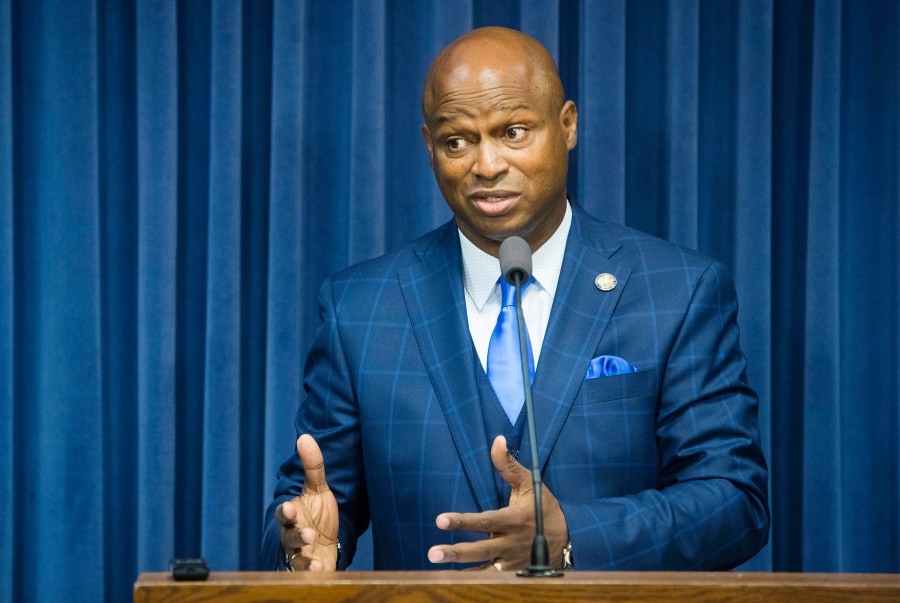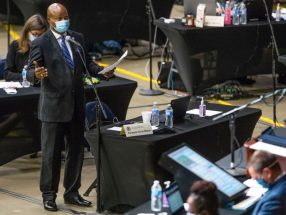SPRINGFIELD, Ill. (NEXSTAR) — Illinois House Speaker Chris Welch (D-Hillside) outlined crime, inflation, and the state budget as top legislative priorities in 2022 during a one-on-one interview with Capitol Connection host Mark Maxwell. Welch also explained why he believes the legislature should continue to relax in-person voting requirements, and defended partisan gerrymandering of the new political maps.
Below is a transcript of the interview, which has been lightly edited for clarity:
Mark Maxwell: What do you think are the issues that weigh most heavily on voters minds as they select the next leaders of our state?
House Speaker Chris Welch: Well, I think the issues that weigh most heavily on voters mind are the issues they’re talking about at their kitchen table — the issues that we’re hearing across dinner tables all across our districts — and that’s ‘How do they keep a roof over their head?’ ‘How do they pay next month’s rent or next month’s mortgage?’ ‘How do they keep that small business open that they started?’ And those are the things that we’re talking to our constituents about all across this state. And we’re pointing to things that we did in the budget to help them keep a roof over their head, to help them keep their small businesses open. And those are the things that will be top of mind as we prepare for the budget this year as well.
Maxwell: Where do you rank inflation? What are the possible solutions that a state can do to address a larger national issue?
Welch: Inflation is certainly an issue. People are concerned about inflation because it costs more to buy beef for dinner. It costs more to put gas in your car. It costs more to do many things today that you did last year at this time. And so what we have to do as part of our budget is to continue to recognize that we’re in the midst of a global health pandemic. That pandemic has led to supply chain issues, which have led to inflation. And so we have to continue to be able to address putting money in people’s pockets to help them address these issues. And all of those will be top of mind as we as we prepare to do our budget.
Maxwell: Just last month in December, consumer prices spiked 7%. That was the fastest rate of inflation increase since 1982. Do you think Democrats see that in the electorate? And are they bracing for that at the ballot?
Welch: Yeah, I mean, of course we see inflation. We see it every time we go to the grocery store, we see it every time we go to the gas station. Democrats are well aware of the climate that we’re in as we enter 2022 and the election season, and we have to go out and do the work, Winners do the work. We have to go out and talk to our constituents and point to them the things that we have done to help make their lives a bit easier. We have to show them what we’re going to continue to do because we’re in the midst of a global pandemic. We’re going to continue to do some things. We have some resources provided through the federal government, the ARP funds. Thankfully, Democrats didn’t spend all of that money in year one. We were planning for year two and year three. We planned ahead. We know that this pandemic wasn’t going to go away overnight, and so we’re prepared to continue to help address the issues that Illinoisans face all across the state.
Maxwell: When do you hope to see the General Assembly returning to work in person here? Both chambers.
Welch: Well, you know, I think with most things, we do better work when we’re in person. I think we would all like to be back in person. We enjoyed being back in person and being around each other. But we’re in the midst of a COVID surge. And we’re gonna watch the numbers very closely. Hopefully, we’re at peak and the numbers will start going down fairly soon and we can return back to in person sooner than later. However, the work of the General Assembly has not stopped. We are still working in the virtual space. We’re doing our committee work. If we were in person right now, all we would be doing, Mark, is running up and down that hallway that you sit in right now going from committee room to committee room. And so we’re running from committee room to committee room virtually. The work of the legislature is continuing even though we’re not there in person.
Maxwell: The House and the Senate just passed remote voting rules and remote committee rules again for this third year in a row. Let me go back to December of 2020. That was the peak of the deadliest wave of COVID-19 that we had. We didn’t have vaccines at the time. And you were meeting at a committee here in person, that Special Investigative Committee. Since then, schools have returned to work in person. We’ve seen a lot of other types of industries return to work in person. We’ve had the rollout of the vaccine. Lawmakers were among some of the very first groups of people entitled to access to that vaccine, plus the masking requirements, the distancing. We know how to do this. And I just wonder, with all of those things that have changed, how can we still justify meeting remotely today? Why can’t people space out in a committee room with a mask on?
Welch: Well, as you know, Mark, in the legislative space, it’s more than just members when we’re in person. There are staff that we have to be considerate of. There’s journalists like yourself that we have to be considerate of, and those who follow what we do on the legislature. And, you know, we have to be considerate of everyone. And we want to make sure that everyone is as safe as possible. The virtual committees work very well. I think we had probably one of the busiest years last year than we had in quite some time. It showed that the committee work that was done virtually works quite well. And so we do plan to return in person at some point. I like that to be when we believe it’s safest to do so. If you saw a press conference by Governor Pritzker this week, hospitalizations are smashing records, according to Doctor Ezike. We cannot ignore that. And unfortunately, many of our colleagues, particularly those on the other side, like to flaunt our mask rule, they don’t like to have the mask on, we have to constantly remind them to put the mask on. We don’t know if they’re vaccinated or not. And we know that these records of hospitalizations is because of those who are unvaccinated. And so we have to be mindful of our entire surroundings and try to operate as safely as we possibly can. When we were last year a couple of weeks ago, I had to take into mind that most of our staff was out, many of them because of COVID positive tests. They have family members and members have family members. We have to think about the whole and not just ourselves.
Maxwell: There were dozens of Illinois Democrats, including a few members of Congress, who recently advocated for expanding the size of the Supreme Court, that old term ‘packing the court.’ I didn’t see your name on it. Where do you stand on that issue?
Welch: Well, you know that’s not an issue before us in Illinois because that’s a federal issue. It’s certainly something that our Congress should talk about and consider. I’m concerned about a lot of advocacy coming out of our Supreme Court. You know, right now, they’re doing a lot of advocacy on the Supreme Court rather than interpreting laws and following precedent. So I can understand certainly why that debate is happening in Washington. But I really don’t have an opinion on that.
Maxwell: The House and Senate, when they were here that one day this last week, they also passed the subcircuit judicial maps. This is something that you just have to do. It’s on the calendar every 10 years. But Republicans, of course, were not thrilled with the way in which Democrats went about it, which was to take at-large districts, shrink them down and really divide up [to determine] which voters would elect which judges. Is that also influencing the shape of the judiciary?
Welch: Our job as the legislature is to do redistricting every 10 years. And we did that this year and last year. And a three judge Federal Court has said that our approach was the right way. Members on the other side are gonna complain. That’s what they do. They do it very well. But we got it right. We crossed our T’s and dotted our I’s, and we used that model at every phase, whether it was the legislative map, the Congressional map or judicial maps. We follow the guidance that our lawyers and the courts have provided us over the years.
Maxwell: President Obama has had some pretty pointed remarks even just this last year, within the last few months. He called gerrymandering a pernicious effect that weakens the power of voting. He said it basically — I’m paraphrasing here — but it dilutes universal suffrage, the idea that everybody can vote, by sort of stacking the deck with what odds will affect which outcomes here or there. Illinois Democrats say, ‘We lead the country on issues of climate change,’ ‘We lead the country on issues of criminal justice reform.’ On this issue of gerrymandering and partisan influence over over who holds power, why not lead the country on that?
Welch: Well, first of all, Mark, let me say this: I think whatever should be done, whoever’s in charge, should follow the law. And as the three judge panel said unanimously, we did follow the law. We followed every principle of the law and got it right. And in 2030, I certainly hope whoever is in charge will follow the law. I am not one who believes in unilateral disarmament. Until the law changes on the federal level and all states are playing by the same rules, I don’t believe in unilateral disarmament. And we’re not going to start now and I don’t support it.
Maxwell: With respect, that argument really only applies to Congress, right? Because that’s where the makeup of the majority in the House in Congress would be effected. At the state legislature, you’re not competing with North Carolina or Wisconsin, you’re competing with Macomb and Quincy.
Welch: No. I’m competing with no one. I am following the law of the land, Federal Court precedents, Illinois Court precedent, and I think whoever’s in charge should do just that. What I’m saying to you, a three judge panel, three federal judges, three people who are appointed by Democrats and Republicans, even Trump appointees, said the legislature follow the law. And that’s what our obligation is is to follow the law. We did that. We got it right. And I would expect whoever’s in charge to do the same.
Maxwell: I’m not suggesting that the Democrats broke the law in the House or Senate passing these maps. The question is really about what is the long term thing to do that’s in the best interest of our democracy. There are voters in Effingham, in Danville, in Taylorville, across central and southern Illinois that have felt for years, perhaps since the Cutback Amendment, that their voices are not being heard in the legislation passed in Springfield. That’s the effect President Obama warned about that with gerrymandering, more people’s voices are being whittled away, and they’re losing that seat at the table.
Welch: Well, I can say this: we followed the data. And I said all along, Mark — and I think I mentioned this to you when we talked early last year — that diversity is the strength of this state, and we have a beautiful state that’s diverse up and down, North, South, East and West. And the map that we put forward, the map that passed the legislature that was signed into law by the governor and that was found legal by a three judge federal panel, really emphasized the diversity of this state. It really showed up in our maps. And so if those folks weren’t being partisan, they would tell you that every part of the state is accurately reflected in our diverse map.
Maxwell: I know we’re running out of time. What’s a quick preview of what we should expect on the agenda in 2022?
Welch: Budget. Budget is our top priority. It’s a very important document. It’s a moral document. It tells you what’s important to us. And we’re going to be able to address a lot of things right there within our budget, including crime.





